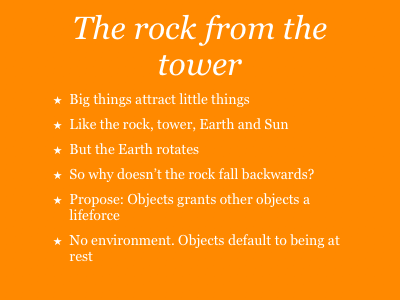
Let’s pretend that gravity has just been proposed, that there is a nature of small things to head towards big things somehow. It’s not just gravity that’s postulated here, it’s the whole idea of a universal force in a universe which is full of objects. That’s a really big idea: it means the earth is an object, like a person is an object, like the sun is an object, like a grain of sand is an object… A great step in abstract thinking. The repercussions of postulating a simple invisible thing to explain falling small things are that you envelop the entire universe in this idea, and that has consequences.
One consequence is that you can start thinking of the earth and the sun together, and you inevitably get to the point where you say “the world is turning.” This leads to problems.
[I have to recommend the book Against Method at this point, which has a section on early gravity. A fantastic book, and a convincing argument that a progression of paradigms is not the same as progress, whatever that is.]
And here we come to the first step. Each step corresponds to a problem which must be resolved. The problem: If there is gravity, this implies the world is turning, and that implies a falling object should move sideways, because the world’s surface moves away underneath it… but it doesn’t. There’s our contradiction.
So the first resolution is to find a way for both gravity and the turning of the earth to be retained. Here’s the problem as stated: If you drop a rock on a moving boat, the rock moves backwards, relative to the boat, a bit. (Actually this is false, it’s air resistance, but the experimenters didn’t realise that.)
But if you drop a rock off a tower, it doesn’t move backwards (you’d expect it to, if the earth, like the boat, was moving). Therefore the tower, and so the earth, isn’t moving. But we know the world is moving!
Here’s the proposed solution: Object inheritence. The rock stays with the tower because the tower is bigger. Bigger things have a kind of power over smaller things that originate from it. Objects move together.
We’ll say that objects are imbued with a lifeforce from what lets it go. The lifeforce ebbs away, and the object ends up under something else’s power. If you throw an object, it goes forward while it has your energy in it… then it’s suddenly overwhelmed and plummets.
There is no environment here. There are just objects working on other objects, but they’re all in a flat space. Objects only do things if they have residual energy and something is affecting them—but their default position is at rest.
Objects are told what to do by things outside them. That’s step 1, in our understanding of gravity.
[I have to put in a word for these ideas, while we’re talking about it. These ideas aren’t stupid, or unprogressed. They’re far more human and based on observation than the ideas we have now. My specific objection is to that old chestnut about how fast objects fall. Until Galileo, people say, nobody realised that objects of various weights all fall at the same speed; if an object is twice as heavy, they assumed it would fall twice as fast. Now, let’s say you push two cars, and one is twice as heavy as the other. You’ll only be able to push it half as fast. Let’s say that cars have a “nature” that they “want” to go at a certain speed, or that they “resist” moving. For falling objects, the fact that they fall at the same speed – regardless of weight – is remarkable. Falling completely overrides the totally apparent “resistence to movement” nature of all objects. An object twice as heavy really does fall twice as fast… relative to its nature. If you live in a world which is focused more on the human interactions with objects, rather than their abstract properties, and you’re centred on the way you physically work with these things, the twice as heavy/twice as fast statement is completely true. It’s pretty insightful too, given it roles the ideas of momentum, gravity being different from other, more human, forces, and human physicality all into one concept. Just because people are a long way away in history, that doesn’t mean they were stupid. We’re all members of the Holocene, we’re all as bright as each other.]
Matt Webb, posted 2005-09-02 (talk on 2005-06-11)